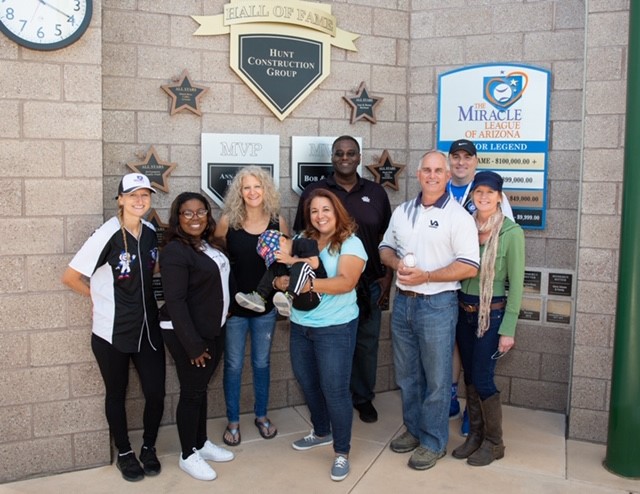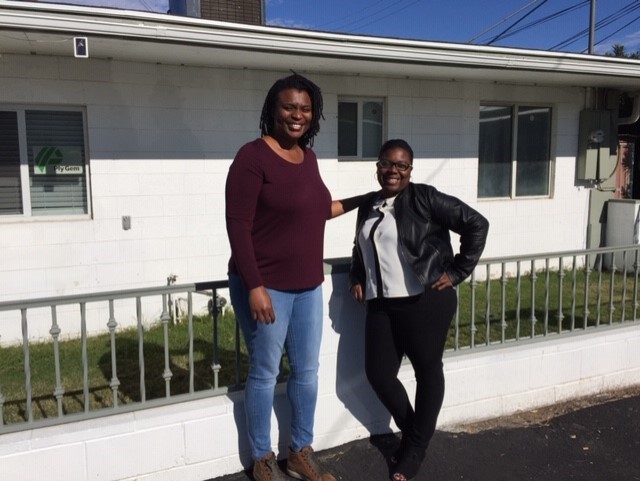After a cancer scare in 2018, Laveen, Arizona resident Victoria Thompson became determined that her life should have a deeper meaning.
“Once the [biopsy] was negative, I was sitting there thinking, I only have one life,” Thompson says. “I’d done all the research for years. I have the background. It was time to take the plunge.”
Thompson is the founder of the nonprofit We Steel Rise, based near Phoenix. A specialty halfway house, it was formed with a mission to help female military veterans re-enter their lives after being incarcerated for nonviolent crimes.
The six-month program offers 10 women housing while they also work to prepare themselves for the remainder of their lives. The first two classes saw all but one woman (who was offered a job after three months) successfully complete the six-part program: a financial course, service industry skills training, art therapy, job preparation, case management and parenting classes.
“There are so many programs out there for male veterans coming out of prison, which is fantastic, but there’s none that appeal specifically to women, and that’s a huge problem,” Thompson says. “The percentage of women in general going to prison the last decade has increased and the programs just haven’t caught up.”

Growing up in Toledo, Ohio, Thompson was surrounded by what would become her life’s work. Her mother was a 911 dispatcher and several relatives were social workers. After graduating high school a year early, she earned a bachelor’s degree in criminal justice from Tiffin University before adding a master’s, also in criminal justice, from Grand Canyon University. While in college, Thompson also joined the Ohio Air National Guard and was activated after 9/11. She found out she was pregnant with the first of her three children, and was assigned to administrative duties. She ended up spending 11 years in the Air Force.
After leaving the military, she became a parole officer for the Department of Corrections in Texas. Her job allowed her to see firsthand some of the experiences of those released from prison and the tragic events that led them there in the first place.
“The system really isn’t set up to help them, so I was always trying creative ways to assist, and I tried to learn each person I was responsible for. They weren’t just a case file, they were people,” Thompson says. “I was also shocked such a large percentage of the women were veterans. We needed to find ways to help them; I felt we owed them that second chance.”
The next stop in Thompson’s journey was working as a housing specialist for the Veterans Health Administration. Her focus was finding affordable housing for homeless veterans, most of whom had credit problems and/or criminal records. Thompson often worked around those issues by finding private landlords willing to take a chance based on her recommendation. Of the more than 200 veterans she’s placed so far, more than 40 percent have been women.
For the initial launch of We Steel Rise, Thompson took some time off from her day job, completely supported by her superiors, and traveled to Arizona prisons to interview applicants for the charter class. She already purchased a house, through grants and donations, in South Phoenix capable of sleeping 10. It was equipped with an adjacent computer lab building where the women spend several hours a day.

There’s a house manager on site every day and Thompson is there when time allows, never missing the Friday meetings when she and the residents review the week’s progress and challenges.
“I’ve never been to prison; I’ve worked in one,” Thompson says. “But those are two quite different experiences, so it’s important for us to come together as one, to understand each other, really make it like a family. We have quarterly dinners and I bring my family. Their families come. We all need that support system for success.”
A typical day at the We Steel Rise house starts at 7 a.m. The women alternate cooking and chores, then at 9 a.m., they begin their online course work and look for jobs. Thompson says the groups become tightknit units, not only because they are used to the team environment from the military, but because each woman understands what the others are dealing with.
Growth is Thompson’s next goal for We Steel Rise. Thompson is still working at the VA, but plans to leave once the pandemic lifts so she can open a few more houses, including one she has already purchased in her hometown of Toledo. Habitat for Humanity is already in prisons there, providing training programs like Thompson’s, so she expects the transition to be simple.
She cites as a positive sign that more and more prisons are adopting rehabilitation models rather than correctional.
“This is the best time ever for criminal justice reform,” she says. “There’s more support and less of a stigma when people leave jail, especially with some crimes that aren’t even illegal any longer. This journey has just been amazing for me and these women who have already gone through the program. And we’re just getting started. We’re going to change a lot of lives for the better.”
This article originally appeared in the March/April 2021 issue of SUCCESS magazine.
Photos Courtesy of Victoria Thompson



